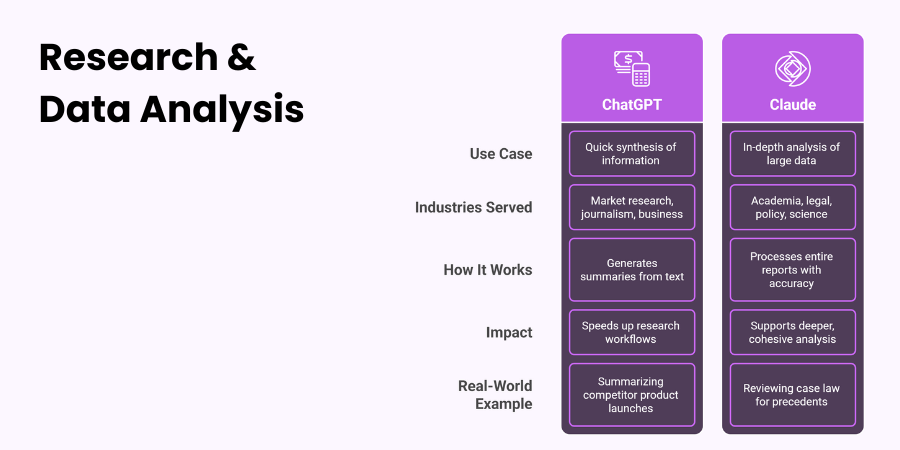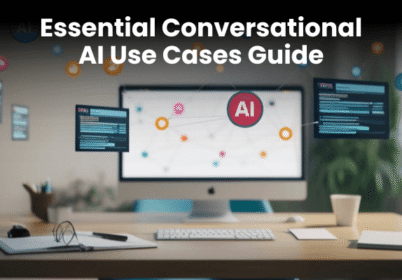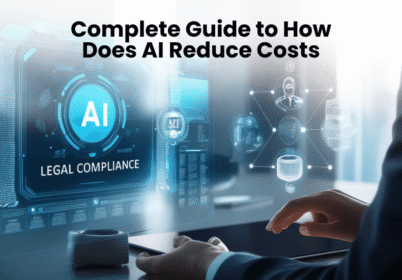ChatGPT vs Claude: In-Depth Comparison and Best Use Cases
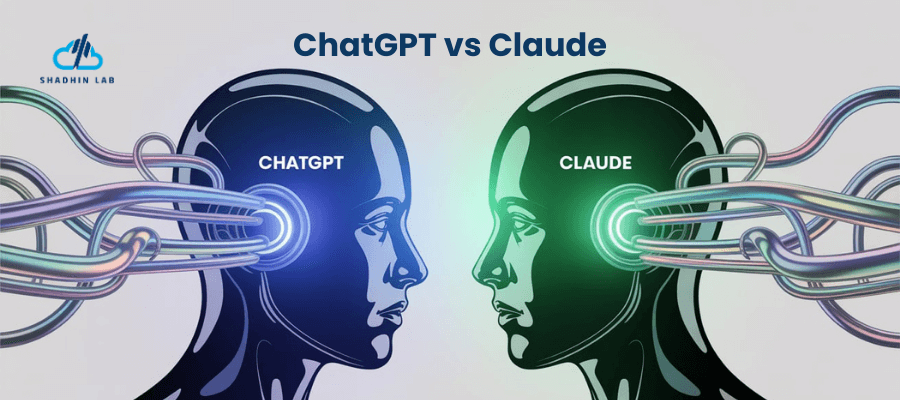
Table of Contents
The artificial intelligence landscape continues to evolve rapidly with powerful conversational AI models transforming how we interact with technology. ChatGPT and Claude represent two of the most significant contenders in the current AI assistant ecosystem. These leading models have emerged as frontrunners in the conversational AI space throughout 2025. Both offer impressive capabilities but differ in important ways that impact their suitability for various tasks. Understanding these differences helps users select the optimal AI assistant for their specific needs. This comparison explores their unique strengths, limitations, and ideal use cases to guide your decision-making process.
Table of Contents
Overview of ChatGPT
ChatGPT is a sophisticated conversational AI model developed by OpenAI, first released in November 2022. The model builds upon the GPT architecture that revolutionized natural language processing capabilities in recent years. OpenAI designed ChatGPT primarily as an AI assistant capable of engaging in helpful, harmless, and honest conversations with humans. The system excels at understanding context, generating human-like responses, and performing a wide range of language-based tasks.
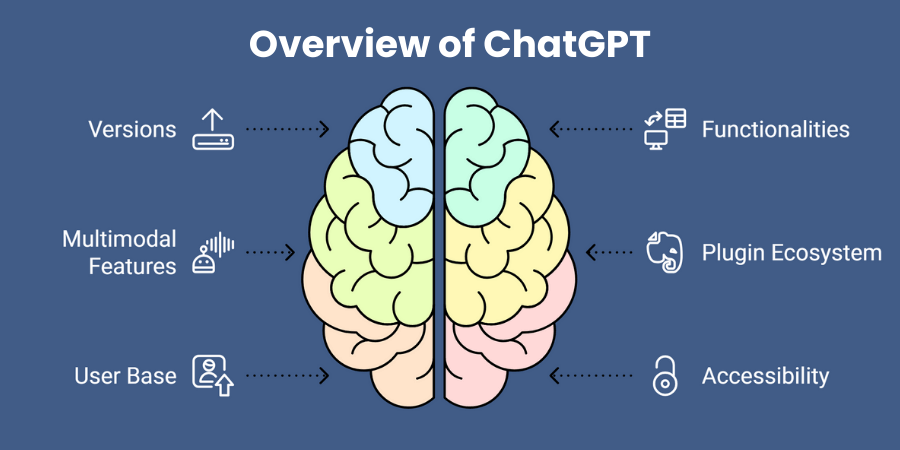
ChatGPT exists in multiple versions, with GPT-4o representing the most advanced iteration currently available to users. The free tier provides access to GPT-3.5, while premium subscribers can utilize GPT-4o with enhanced reasoning abilities. The model demonstrates remarkable versatility across domains including creative writing, coding assistance, educational support, and business applications. OpenAI continues to expand ChatGPT’s capabilities through regular updates and integration of multimodal features.
The system can now process images, create visual content, analyze data, and even understand voice inputs. ChatGPT’s plugin ecosystem further extends its functionality by connecting to external tools and services. The model maintains popularity among individual users, educators, content creators, programmers, and businesses seeking to automate customer interactions. OpenAI has focused on making the technology accessible while implementing safeguards against potential misuse.
Overview of Claude AI
Claude AI represents the flagship conversational assistant developed by Anthropic, a company founded in 2021 by former OpenAI researchers. Anthropic built Claude with a distinctive approach centered on constitutional AI principles and safety-first design philosophy. The company emphasizes creating AI systems that remain helpful, harmless, and honest even in challenging scenarios. Claude embodies this vision through its sophisticated understanding of nuance and ethical considerations.
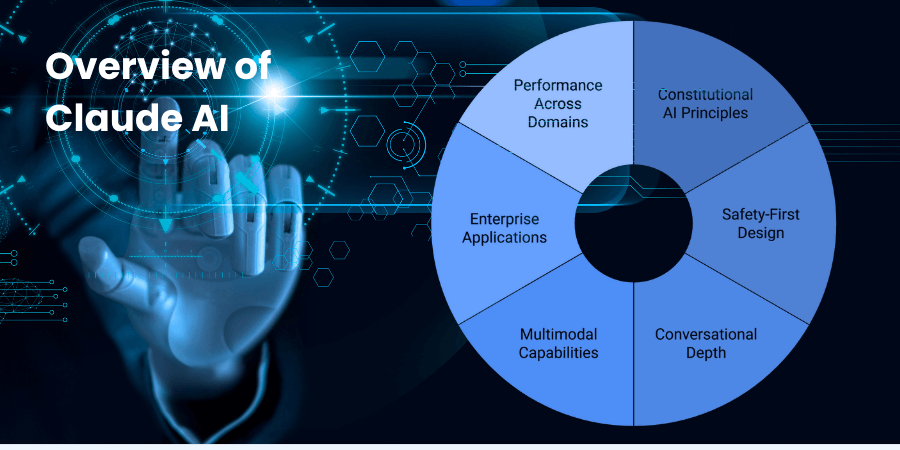
The assistant has evolved through multiple versions, with Claude 3 Opus representing its most capable iteration. Claude distinguishes itself through exceptional conversational depth, nuanced understanding of complex topics, and thoughtful responses to sensitive queries. Anthropic designed Claude to excel at tasks requiring careful reasoning, detailed analysis, and maintaining context over lengthy exchanges. The model demonstrates particular strength in content generation, document analysis, and research assistance.
Claude’s architecture incorporates Constitutional AI training methods that help align the system with human values. The assistant can process and analyze extensive documents, making it valuable for legal, academic, and research applications. Claude supports multimodal capabilities including image understanding and analysis across various formats. Anthropic positions Claude as a trustworthy AI assistant for enterprise environments where safety and reliability remain paramount concerns.
The system maintains impressive performance across domains while adhering to strict safety guidelines. Claude excels particularly in scenarios requiring nuanced understanding, careful reasoning, and maintaining coherence across extended conversations. Anthropic continues enhancing Claude’s capabilities while maintaining its core focus on developing AI that remains beneficial and aligned with human values.
ChatGPT vs. Claude: Head-to-head comparison table
| Feature | ChatGPT | Claude |
| Developer | OpenAI | Anthropic |
| Latest Version | GPT-4o | Claude 3 Opus |
| Context Window | 128,000 tokens | 200,000 tokens |
| Multimodal Capabilities | Text, images, voice, video | Text, images |
| Free Tier | Available (GPT-3.5) | Available (Claude 3 Sonnet) |
| Premium Pricing | $20/month (ChatGPT Plus) | $20/month (Claude Pro) |
| Enterprise Options | Custom pricing | Custom pricing |
| API Access | Available | Available |
| Knowledge Cutoff | April 2023 (with web browsing) | Mid-2023 |
| Code Generation | Strong, especially Python | Strong across languages |
| Math Capabilities | Advanced | Advanced |
| Plugin Ecosystem | Extensive | Limited |
| Document Analysis | Good | Excellent |
| Safety Measures | Moderate constraints | Stronger constraints |
| Hallucination Rate | Moderate | Low |
| Response Speed | Very fast | Fast |
| Reasoning Depth | Good | Excellent |
| Creative Writing | Excellent | Very good |
| User Interface | Polished, feature-rich | Clean, minimalist |
| Mobile App | Available | Available |
This comparison highlights the fundamental differences between these leading AI assistants. ChatGPT offers broader multimodal capabilities and an extensive plugin ecosystem for enhanced functionality. Claude provides a larger context window and demonstrates stronger performance in document analysis tasks requiring deep comprehension. Both systems maintain competitive pricing structures and enterprise options for organizational deployment. The selection between these platforms often depends on specific use case requirements and personal preferences.
ChatGPT vs. Claude: Key differences and similarities
ChatGPT and Claude share fundamental capabilities as large language models but diverge significantly in their design philosophies and strengths. The most notable difference appears in their approach to safety constraints and content filtering. Claude implements more conservative guardrails that limit certain types of content generation and responses. ChatGPT employs a more flexible approach that permits broader creative expression while maintaining basic safety standards. This distinction becomes particularly evident when handling sensitive topics or potentially controversial requests.
The models differ substantially in their context handling capabilities and memory retention. Claude excels with its impressive 200,000 token context window, enabling analysis of lengthy documents and maintaining coherence across extended conversations. ChatGPT offers a smaller but still substantial context window that proves sufficient for most common tasks. Claude demonstrates superior performance in tasks requiring nuanced reasoning and careful analysis of complex information. ChatGPT often excels in creative scenarios requiring imaginative thinking and novel content generation.
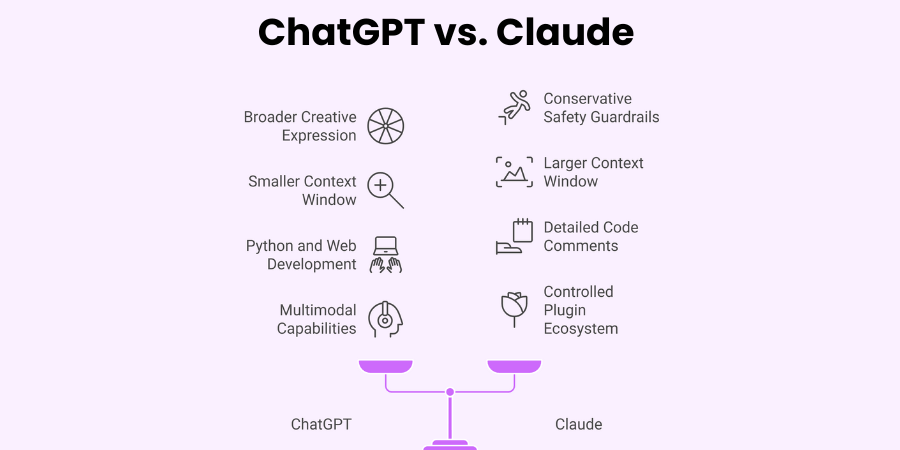
Both assistants handle coding tasks effectively but with different strengths and approaches. ChatGPT typically performs better with Python and web development tasks, while Claude often produces more carefully commented and explained code. The models approach factual information differently, with Claude generally demonstrating lower hallucination rates but sometimes declining to answer uncertain questions. ChatGPT more readily provides information but occasionally introduces inaccuracies when addressing topics beyond its training data.
These AI assistants share important similarities in their conversational abilities and user interaction patterns. Both maintain natural dialogue flow, understand context from previous exchanges, and adapt their tone appropriately. The systems demonstrate impressive versatility across domains including business, education, creative writing, and technical support. Both models continuously improve through regular updates and refinements to their underlying architectures. ChatGPT and Claude both excel at summarizing information, explaining complex concepts, and generating well-structured content.
The assistants differ in their handling of multimodal inputs and processing capabilities. ChatGPT offers more comprehensive multimodal capabilities including voice interaction and video analysis features. Claude provides strong image analysis but currently lacks some of the additional modalities supported by ChatGPT. The plugin ecosystem represents another area of significant divergence, with ChatGPT offering extensive third-party integrations. Claude maintains a more controlled approach to external connections, prioritizing reliability over extensibility.
ChatGPT vs. Claude: Best Use Cases
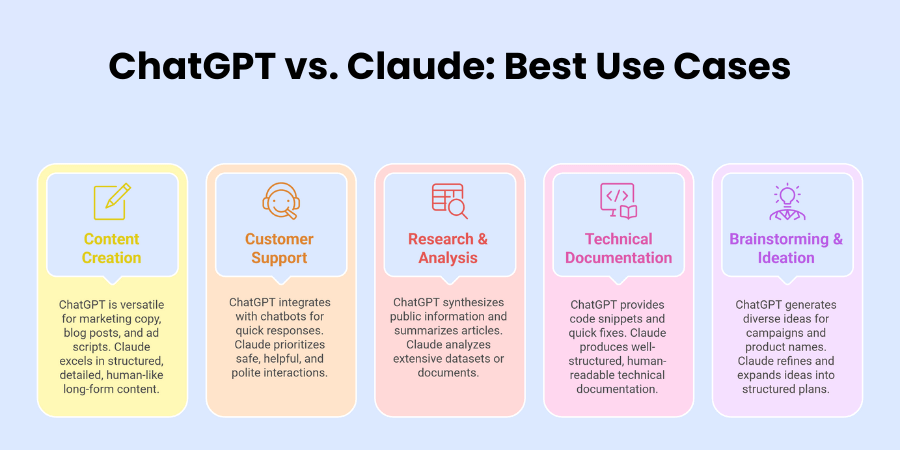
Use Case 1 – Content Creation & Marketing Copywriting
ChatGPT
ChatGPT is highly versatile for producing marketing copy, blog posts, product descriptions, and ad scripts with diverse tones and creativity.
対応業界:
E-commerce, advertising, digital marketing agencies, startups, and publishing.
How It Works:
Trained on a broad dataset, ChatGPT can adapt its style, tone, and format to match specific brand voices.
インパクト:
Accelerates content production, reduces creative blocks, and allows rapid A/B testing of messaging.
Real-World Example:
A fashion brand uses ChatGPT to create seasonal campaign captions in multiple tones, then tests them on social media.
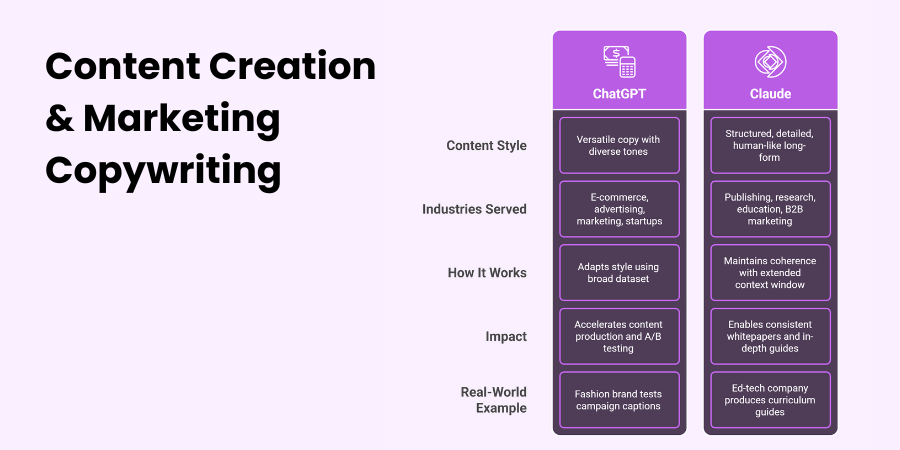
Claude
Claude excels in producing structured, detailed, and human-like long-form content with a natural narrative flow.
対応業界:
Publishing, research organizations, education, and B2B marketing firms.
How It Works:
Its extended context window allows it to maintain coherence across longer documents without losing thematic accuracy.
インパクト:
Enables detailed whitepapers, e-books, and in-depth guides that stay consistent in tone and logic.
Real-World Example:
An ed-tech company uses Claude to produce 20-page curriculum guides with smooth transitions and topic depth.
Use Case 2 – Customer Support Automation
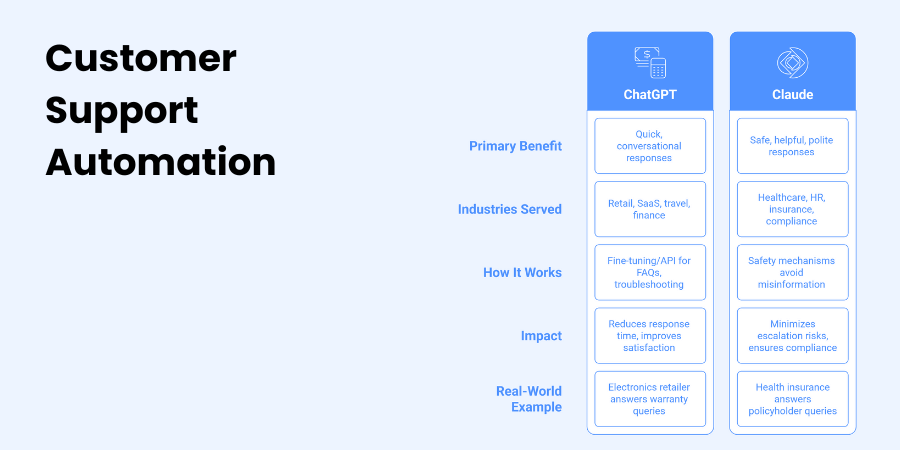
ChatGPT
ChatGPT integrates seamlessly with support chatbots to deliver quick, conversational responses to customer queries.
対応業界:
Retail, SaaS, travel, hospitality, and financial services.
How It Works:
Using fine-tuning or API integration, it can handle FAQs, troubleshoot common issues, and route complex cases to agents.
インパクト:
Reduces first-response time and support workload while improving customer satisfaction scores.
Real-World Example:
An online electronics retailer uses ChatGPT-powered bots to answer warranty and delivery queries instantly.
Claude
Claude prioritizes safe, helpful, and polite responses, making it well-suited for sensitive customer interactions.
対応業界:
Healthcare, HR tech, insurance, and compliance-heavy sectors.
How It Works:
Its safety mechanisms and refusal handling ensure responses remain within compliance and avoid misinformation.
インパクト:
Minimizes escalation risks in industries with strict communication standards.
Real-World Example:
A health insurance company uses Claude for initial policyholder queries, ensuring all responses meet regulatory guidelines.
Use Case 3 – Research & Data Analysis
ChatGPT
ChatGPT is ideal for quick synthesis of public information, summarizing articles, and suggesting next research steps.
対応業界:
Market research firms, journalists, analysts, and business consultants.
How It Works:
Generates concise summaries and comparative insights from uploaded or linked text sources.
インパクト:
Speeds up research workflows and reduces the need for manual note-taking.
Real-World Example:
A business consultancy uses ChatGPT to quickly summarize competitor product launches before client meetings.
Claude
Claude’s large context window allows in-depth analysis of extensive datasets or documents in one go.
対応業界:
Academic institutions, legal firms, policy research organizations, and scientific R&D teams.
How It Works:
Can process and reference entire reports, papers, or transcripts, maintaining contextual accuracy throughout.
インパクト:
Supports deeper, more cohesive analysis without losing important details.
Real-World Example:
A legal research team uses Claude to review hundreds of pages of case law for relevant precedents in minutes.
Use Case 4 – Technical Documentation & Code Assistance
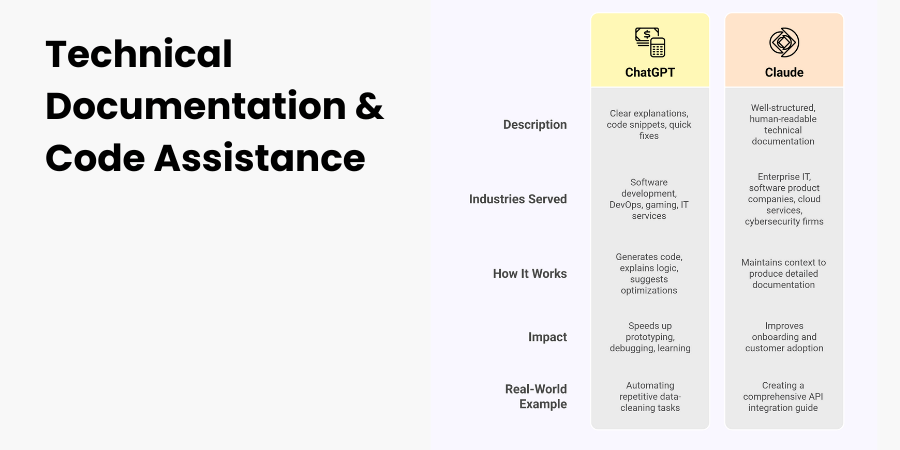
ChatGPT
ChatGPT provides clear explanations, code snippets, and quick fixes for developers at all skill levels.
対応業界:
Software development, DevOps, gaming, and IT services.
How It Works:
It can generate code in multiple languages, explain logic, and suggest optimizations based on developer prompts.
インパクト:
Speeds up prototyping, debugging, and learning for developers, especially in fast-paced project environments.
Real-World Example:
A startup uses ChatGPT to generate Python scripts for automating repetitive data-cleaning tasks.
Claude
Claude is strong in producing well-structured, human-readable technical documentation and step-by-step guides.
対応業界:
Enterprise IT, software product companies, cloud services, and cybersecurity firms.
How It Works:
Maintains long-form context to produce detailed API docs, onboarding manuals, or complex troubleshooting instructions.
インパクト:
Improves developer onboarding and customer adoption through clear, consistent documentation.
Real-World Example:
A cloud solutions provider uses Claude to create a comprehensive 40-page API integration guide without losing formatting or clarity.
Use Case 5 – Brainstorming & Ideation
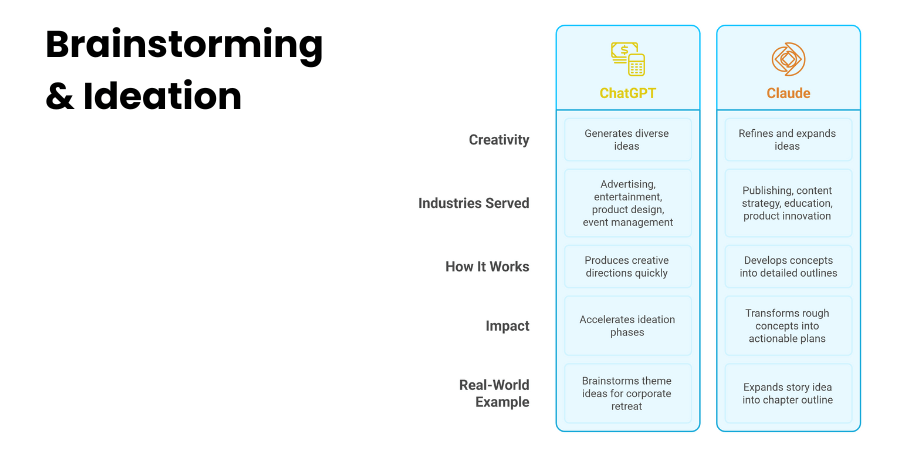
ChatGPT
ChatGPT is highly creative in generating diverse ideas for campaigns, product names, or marketing concepts.
対応業界:
Advertising, entertainment, product design, and event management.
How It Works:
Leverages its wide training data to produce multiple creative directions quickly, adapting to different brand tones.
インパクト:
Accelerates ideation phases, helping teams test more concepts in less time.
Real-World Example:
An events agency uses ChatGPT to brainstorm 50+ theme ideas for a corporate retreat within minutes.
Claude
Claude excels in refining そして expanding ideas into fully fleshed-out, structured plans or narratives.
対応業界:
Publishing, content strategy, education, and product innovation teams.
How It Works:
Takes initial concepts and develops them into detailed outlines, proposals, or structured storyboards.
インパクト:
Transforms rough concepts into actionable plans without losing creative depth.
Real-World Example:
A publishing house uses Claude to expand a one-line children’s story idea into a complete chapter outline.
ChatGPT vs. Claude: Which is right for you?
Selecting the ideal AI assistant requires careful consideration of your specific needs, priorities, and constraints. The following decision framework helps match your requirements with the most appropriate tool.
| Consideration Factor | Choose ChatGPT if you… | Choose Claude if you… |
| Professional Role | Work in creative fields, software development, or marketing | Work in legal, research, healthcare, or compliance-focused roles |
| Primary Tasks | Need creative content, code generation, or plugin integrations | Need document analysis, research assistance, or ethical reasoning |
| Budget Constraints | Prefer free tier access with basic functionality | Require free access with stronger reasoning capabilities |
| Technical Expertise | Have moderate to advanced technical skills | Prefer straightforward interfaces with less technical complexity |
| Privacy Concerns | Accept standard data handling practices | Require stricter data privacy guarantees |
| Content Volume | Work with shorter, focused content pieces | Regularly analyze lengthy documents or maintain extended conversations |
| Integration Needs | Require connections to multiple external tools and services | Prioritize core functionality over extensive integrations |
| Safety Requirements | Accept moderate content filtering | Require stricter content safety measures |
| Response Style | Prefer creative, conversational responses | Value analytical, carefully reasoned responses |
| Multimodal Needs | Require voice, image, and video processing capabilities | Primarily need text and basic image analysis |
For individual users seeking versatile assistance across multiple domains, ChatGPT often provides the optimal balance of capabilities. The system’s broad feature set and plugin ecosystem support diverse applications from creative writing to coding. Small businesses with limited technical resources may benefit from ChatGPT’s intuitive interface and extensive documentation. The platform’s comprehensive multimodal capabilities make it suitable for projects involving various content types.
Enterprise organizations handling sensitive information often find Claude better aligned with their requirements. The assistant’s strong safety measures and careful approach to uncertain information reduce potential risks. Research institutions and academic organizations benefit from Claude’s exceptional document analysis capabilities and nuanced reasoning. Legal departments appreciate Claude’s ability to process extensive contracts and provide careful analysis of complex legal language.
Software development teams typically prefer ChatGPT for its stronger coding capabilities and integration options. The system’s plugin ecosystem enables connections with development tools and code repositories. Marketing departments often leverage ChatGPT’s creative strengths for content generation and campaign ideation. The assistant’s versatility supports various marketing tasks from social media content to email campaigns.
Healthcare organizations generally find Claude’s careful approach better suited to their strict compliance requirements. The system’s lower hallucination rate reduces risks when handling medical information. Financial services companies appreciate Claude’s thoughtful analysis of complex documents and careful handling of sensitive data. The assistant’s ability to maintain context across lengthy documents supports comprehensive financial analysis.
結論結論
The comparison between ChatGPT and Claude reveals two exceptional AI assistants with distinct strengths. ChatGPT excels in creative tasks, coding, and applications, benefiting from its extensive plugin ecosystem, offering versatility across domains. It provides valuable support for content creation, software development, and interactive learning. Claude shows remarkable strengths in document analysis, careful reasoning, and handling sensitive information with caution. It performs exceptionally well with lengthy documents and complex ethical considerations, making it ideal for research, legal analysis, and compliance-focused environments.Both assistants continue evolving rapidly through updates and innovations. The best choice depends on your specific needs. Testing both with your workflows helps identify which assistant suits different tasks best. As AI advances, both platforms will keep enhancing their features and performance.
よくある質問
Is ChatGPT or Claude better for coding tasks?
ChatGPT generally performs better for coding tasks, especially in Python and web development. The system provides more interactive debugging support and benefits from extensive programming examples in its training data. Claude produces well-commented code with thorough explanations but sometimes lacks ChatGPT’s technical precision in complex programming scenarios.
Which AI assistant offers better privacy protections?
Claude typically provides stronger privacy protections through Anthropic’s more conservative data handling policies. The company emphasizes data minimization principles and limits information retention. ChatGPT offers standard privacy measures but maintains a broader data usage policy for model improvement purposes.
Can I use both ChatGPT and Claude for free?
Yes, both platforms offer free tiers with certain limitations. ChatGPT provides free access to GPT-3.5 with standard features but without GPT-4 capabilities. Claude offers free access to Claude 3 Sonnet with reasonable usage limits but without the full capabilities of Claude 3 Opus.
Which AI assistant handles sensitive topics more appropriately?
Claude typically handles sensitive topics more cautiously, often declining to respond when uncertainty exists about appropriate boundaries. ChatGPT addresses a broader range of sensitive topics but sometimes provides responses that may require additional context or nuance. Both platforms implement safety measures, but Claude generally applies stricter content filtering.
How do ChatGPT and Claude compare for research tasks?
Claude generally performs better for research tasks requiring analysis of lengthy documents and careful evaluation of evidence. The system’s larger context window enables processing more comprehensive materials simultaneously. ChatGPT provides strong research support for standard queries but may struggle with very extensive documents due to context limitations.
Shaif Azad
Related Post
売上向上につながる対話型AIのユースケース
Are you frequently considering how technology could revolutionize your business operations? Conversational AI use cases are...
AIによるコスト削減の仕組み:ビジネス最適化ガイド
Are you lying awake wondering how your business can survive rising operational costs? Have you watched...
AIが需要予測の精度と意思決定をどのように向上させるか
Are you tired of watching your inventory costs spiral out of control while customers walk away...

